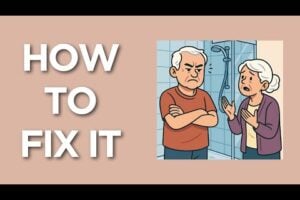MINDFULNESS TRAINING was shown to brighten outlook on life for people with dementia, as well as caregivers. Northwestern University found that just eight sessions of training made a positive difference. Learn more about this study.
- Mindfulness Training eases depression and improves sleep for affected persons and caregivers.
- Modern Mindfulness is based on psychology and science. Be aware that older versions may be Buddhist.
- Living in the present moment can lead to more joy, less worry.
- 8 training sessions made a positive difference.
- Mindfulness works with abilities, rather than focusing on problems.
Amazon.com:
CHICAGO — Mindfulness training for individuals with early-stage dementia and their caregivers together in the same class was beneficial for both groups, easing depression and improving sleep and quality of life, reports new Northwestern Medicine’s study.
“The disease is challenging for the affected person, family members and caregivers,“ said study lead author Ken Paller, professor of psychology at Weinberg College of Arts and Sciences at Northwestern and a fellow of the Cognitive Neurology and Alzheimer’s Disease Center at Northwestern University Feinberg School of Medicine. “Although they know things will likely get worse, they can learn to focus on the present, deriving enjoyment in the moment with acceptance and without excessive worry about the future. This is what was taught in the mindfulness program.”
The study was published in the American Journal of Alzheimer’s Disease and Other Dementias.
Neurodegenerative diseases such as Alzheimer’s are particularly hard on caregivers, who are often close family members. They tend to have an increased incidence of anxiety, depression, immune dysfunction and other health concerns as well as an increased mortality rate, according to prior studies.
This is the first study to show that the caregiver and the patient both benefit from undergoing mindfulness training together. This is important because caregivers often don’t have much time on their own for activities that could relieve their emotional burden.
The training also helps the patient and caregiver accept new ways of communicating, scientists said.
“One of the major difficulties that individuals with dementia and their family members encounter is that there is a need for new ways of communicating due to the memory loss and other changes in thinking and abilities,” noted study co-author Sandra Weintraub, a professor of psychiatry and behavioral sciences at Feinberg and a neuropsychologist at Northwestern Memorial Hospital. “The practice of mindfulness places both participants in the present and focuses on positive features of the interaction, allowing for a type of connection that may substitute for the more complex ways of communicating in the past. It is a good way to address stress.”
The study included 37 participants including 29 individuals who were part of a patient-caregiver pair. Most of the patients were diagnosed with dementia due to Alzheimer’s disease or mild cognitive impairment, often a precursor to dementia. Others had memory loss due to strokes or frontotemporal dementia, which affects emotions as well as speaking and understanding speech. Caregivers included patients’ spouses, adult children, a daughter-in-law and a mother-in-law.
Although the individuals with Alzheimer’s had mild to severe memory loss, they still were able to use other cognitive functions to participate in the mindfulness training and to experience emotion and positive feelings, Weintraub noted.
The participants attended eight sessions designed specifically for the needs of patients with memory loss due to the terminal neurodegenerative illness (dementia) and for the needs of their caregivers. Both groups completed an assessment within two weeks of starting the program and within two weeks of completing it.
Paller had expected mindfulness to be helpful for dementia caregivers based on previous research in the field. But he was uncertain whether a program would be successful for patients with memory impairments and whether patients and their caregivers could be trained together.
“We saw lower depression scores and improved ratings on sleep quality and quality of life for both groups,” said Paller, director of the cognitive neuroscience program. “After eight sessions of this training we observed a positive difference in their lives.”
“Mindfulness involves attentive awareness with acceptance for events in the present moment,” Paller said. “You don’t have to be drawn into wishing things were different. Mindfulness training in this way takes advantage of people’s abilities rather than focusing on their difficulties.”
Developing mindfulness is about learning different habits and a person has to practice a new habit for it to stick, Paller noted.
Paller said he hoped the study findings would encourage caregivers to seek out resources for learning mindfulness for themselves and the individuals with illness.
MORE INFORMATION:
The paper is titled: “Benefits of Mindfulness Training for Patients With Progressive Cognitive Decline and Their Caregivers.”
Other Northwestern authors include Jessica Creery, Susan Florczak, M. Marsel Mesulam, Paul Reber, Jessica Kiragu, Joshua Rooks, Adam Safron, Darby Morhardt, Mary O’Hara, Kathryn Gigler, John Molony and Michael Maslar.
The study was supported by grant P30 AG13854 from the National Institute of Aging/National Institutes of Health, the Retirement Research Foundation, the State of Illinois, and the Mind and Life Institute.
SOURCE:
Marla Paul, Northwestern University













